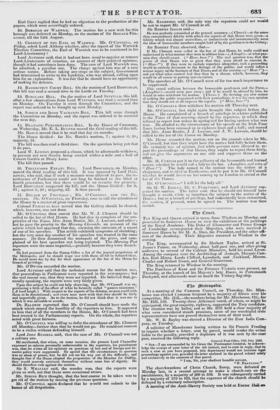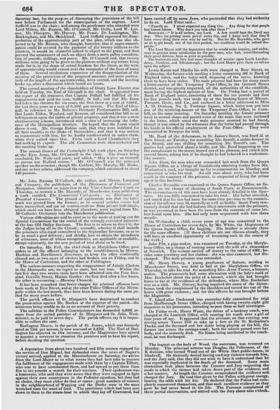ebe aletrapoitilL At a meeting of the Common Council, on
Thursday, Mr. Mire- house was elected Common Seijeant by a majority of fifteen over his competitor, Mr. Hill,—the numbers being, for Mr. Mirehouse, 125; for Mr. Hill, 110. Twenty-three Aldermen voted, of whom, as might be anticipated, the great majority, eighteen, supported the Tory candidate. The election was by ballot, and as Mr. Hill held a clear majority of what were considered stanch promises, some of our worshipful civic
representatives have not proved themselves men of their word.
Mr. W. B. Bayley was elected a Director of the East India Com- pany, on Tuesday.
A solicitor of Manchester having written to Sir Francis Freeing to inquire whether a letter, sent by parcel, would render the writer liable to the penalty, provided a duplicate of it was sent by the next post, received the following reply.
General Post-Office, 10th July 1833, " Sia—I am commanded by his Grace the Postmaster-General, to acknow- ledge the receipt of your letter of the 4th instant, and to state in reply, that in such a case as you have proposed, this department would not institute legal proceedings against you, provided the letter enclosed in the parcel related solely and exclusively to the contents of that parcel.
"I am, Sir, your obedient humble servant,
"F. PREELING.'• The churchwardens of Christ Church, Surry, were defeated on Monday last, in a second attempt to make a church-rate on the parishioners, by a majority of 289 to 103. It was subsequently carried by a majority of 279 to 103, that the expenses of the church should be defrayed by a voluntary subscription. A meeting of the Anti-Slavery Society was held at Exeter Hallett'
Saturday last, for the puipase of discussing the provisions of the bill now before Parliament for the emancipation of the negroes. Lord Suffield was in the chair; and among the gentlemen who attended were Lord Milton, Mr. Buxton, Mr. O'Connell, Mr. Gully, Lord W. Len- nox, Mr. Plumptre, Mr. Harvey, Mr. Pease, Dr. Lushington, Mr: Buckingham, and Mr. Strickland. Lord Suffield expressed his disap- probation of the apprenticeship part of the plan, which was also ob- jected to by Mr. Buxton, who thought, however, that if. negro emanci- pation could be secured by the payment of the twenty millions to the planters, it would be shameful indeed to object to the grant, and thus prevent the attainment of such an object from a mere paltry considera- tion of poundi, shillings, and pence. Mr. O'Connell said, that twenty millions were going to be given to the planters without any return being made for it, in the shape of actual freedom for the slaves, as the term of apprenticeship would extend over the remainder of the lives of many of them. Several resolutions expressive of the disapprobation of the meeting of the provisions of the proposed measure, and more particu- larly of the length of the apprenticeship, were carried, and the meeting broke up, after a discussion which lasted six hours.
The annual meeting of the shareholders of Drury Lane Theatre was held on Tuesday, the Earl of Glengall in the chair. It appeared from the report of the. treasurer, that Captain Pdlhill had fulfilled all his engagements and paid the rent, 9,0001., in full ; and that Mr. Bunn had taken the threatre for six years, the first three at a rent of 8,0001., the last three.years at a rent of 8,500/. per annum: The Earl of Glen- gall, in reference to Mr. Bulwer's Dramatic Performances Bill, said, that Lords Eldon, Wynford, and Kenyon, all considered that bill as an infringement upon the rights of private property, and that it was a mere electioneering scheme, introduced with a view of increasing the influ- ence of the Metropolitan districts. He hoped that the Lords would throw it Mr. George Robins said, that they were indebted for all their troubles to the Duke of Devonshire ; and that it was useless to remonstrate with him, for he hardly condescended to notice them, When they waited upon him. From such a Lord Chamberlain they had nothing to expect. The old Committee were then reelected and the meeting broke up.
The annual dinner of the Cartwright Club took place, on Saturday at the Eyre Arms, Mr. O'Connell in the chair. The dinner being concluded, Dr. Wade said grace, and added, " May it give us strength to pursue our Radical course." Mr. O'Connell was the principal speaker on the occasion ; though Mr. Cohbett, Mr. Murphy, Mr. Hume, and one or two otheis, addressed the company, which amounted to about 140 persons.





















 Previous page
Previous page